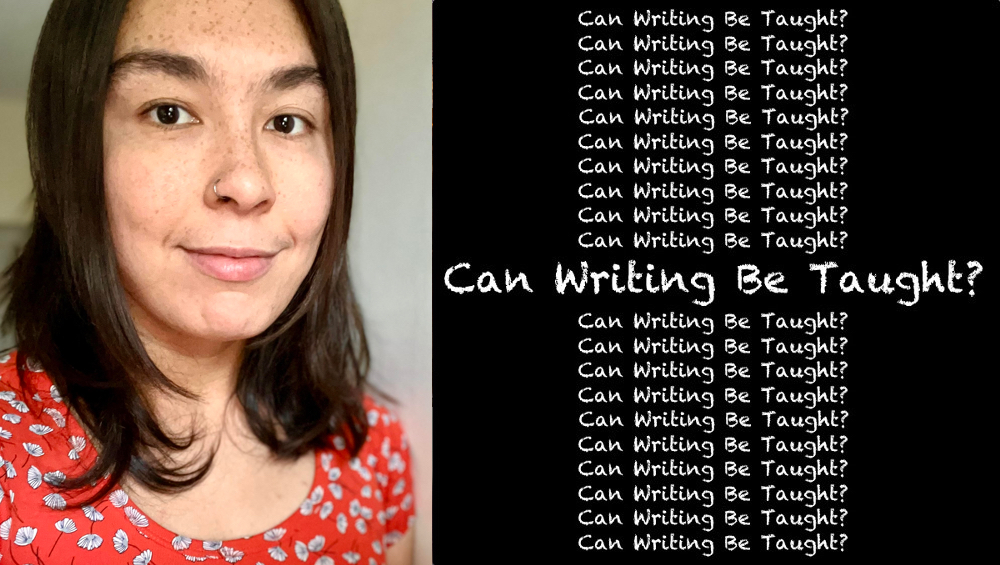Advice
Gabrielle Octavia Rucker Says Every Writer Should Be Resting as Often as They Can
10 questions about writing with author and Catapult instructor Gabrielle Octavia Rucker

In our series “Can Writing Be Taught?”, we partner with Catapult to ask their course instructors all our burning questions about the process of teaching writing. This month, we’re featuring Gabrielle Octavia Rucker, a poet, writer, and asemic artist whose debut collection Dereliction is forthcoming from The Song Cave. Check out the 5-week online generative workshop Rucker is teaching that focuses on ecopoetic practices as a means of personal and psychic liberation. We talked to Rucker about discarding “good” advice, making rest your hobby, and critical generosity.
What’s the best thing you’ve ever gotten out of a writing class or workshop as a student?
Friendship! Even if we’re not the type of friends that constantly chat, I’ve come to meet so many brilliant, talented, kind souls in workshops and I value those connections very much. I’ve also gotten to meet a lot of writers outside of my generation via writing classes and I’ve come to learn a lot from both their writing and personal insights that has really helped me understand and work through some of the insecurities one can encounter as a young writer with dreams. They helped me age gracefully in my artistic practice and better manage, if not eradicate, a lot of my expectations.
What’s the worst thing you’ve ever gotten out of a writing class or workshop as a student?
I’ve come to find that every now and then there are people who will read your work and immediately project all kinds of things onto it/you, rather than reading the work in an open-minded way. Some people have no curiosity towards anything save for themselves and this creates, in my opinion, very rigid readers and students who are only looking to prove what they saw in the writing rather than focus on what might potentially be most helpful for the writer. For example, I once shared a poem that was about a flock of ancient, magical ibis’ reborn as a young girl. In the google comments, a fellow classmate wrote this lengthy thing about daddy issues … I was like, huh? I vividly recall that it was the only comment I got that week that I found to be wholly unhelpful.
What is the lesson or piece of writing advice you return to most as an instructor?
You don’t need to be an expert. You don’t need to know every technical device, you don’t need to follow the elements of style, you don’t need to have read whatever books/authors so-and-so literary authority says you need to have read to be seasoned. You only need to do and read what feels good and purposeful to you, however you find it. Writing is about style (read: voice) and style is like personality, it grows over a long stretches of time and is influenced by a myriad of interests and experiences. I’m not saying actively ignore good advice but accept that not all good advice is gonna agree with you. In sum: fuck it, we ball.
Writing is about style (read: voice) and style is like personality, it grows over a long stretches of time.
Does everyone “have a novel in them”?
Everyone? I don’t know … possessing an internal narrative or a ripe imagination doesn’t automatically translate to one being a storyteller or poet. That’s like asking can everyone sing. Like, yeah I can sing, I can even write a little diddy out but can I hit the notes? Let’s not pretend talent has nothing to do with it.
Would you ever encourage a student to give up writing? Under what circumstances?
I consider writing a vocation—a calling. No one, at least no one with common sense, writes for any other reason but the fact that they feel called to do it. I mean, it’s not inherently lucrative, and it’s an extremely time consuming if not downright haunting practice to dedicate oneself to. Saying that, if someone wanted to quit because their heart was not in it, because they realized that this was not their calling and they would prefer to dedicate their time toward something else then yes, I would absolutely encourage them to quit if they knew it wasn’t right for them. For those who write because they are called to, because they literally can’t fathom doing anything else I would encourage them to slow down when things get overwhelming or frustrating (which they will). Writing will never abandon you. It is patient. It waits.
What’s more valuable in a workshop, praise or criticism?
I recently took a workshop led by Tiana Reid and in class we made a collaborative list of workshop guidelines, a practice I’ve adopted in my teaching. One of the guidelines we all agreed on was “critical generosity”. I loved that idea so much, that one can simultaneously be both generous and critical, that feedback can live outside of the good/bad right/wrong valuable/nonvaluable binary. In practice, if one is being mindful, as one should always try to be, this concept of critical generosity facilitates a really pleasant roundness to workshop. It breaks down the cycle of fear or hubris critique often inspires and roots praise into something tangible and intentional. It encourages both kindness and honesty, all in all, an easier pill to swallow.
If one is being mindful, as one should always try to be, this concept of critical generosity facilitates a really pleasant roundness to workshop.
Should students write with publication in mind? Why or why not?
Having the goal of publication and actively working towards it is fine. Knowing you would one day like to publish is fine but if you’re picking up your pen or sitting down at your computer having already calculated how publishable a poem or story or whatever is then I would seriously encourage you to pause and reflect.
In one or two sentences, what’s your opinion of these writing maxims?
- Kill your darlings: Honestly, I had to google what this lil adage even meant so I could answer this because every time I previously encountered it I would cringe, it sounded so corny and I’m often suspicious of corny shit so it never got incorporated into my belief system. Now that I’m in the know I can say my instinct was correct: it’s silly and counterintuitive.
- Show don’t tell: This won’t always work or be the best practice. For that reason I also tend to discard this as a whole and just do me.
- Write what you know: This has gotten to be a little too rooted in identity for my taste. Outside of the representational, I think writing about things you don’t know or only have some kind of orbital or abstract and incomplete knowledge about is a worthwhile venture. The Passion According to G.H. by Clarice Lispector is a whole book about not knowing or, better yet, sensing that leads to raw knowledge (Truth). Maybe it’s my inclination toward poetics but I would throw out this rule too.
- Character is plot: This is the most interesting of the four to ponder because it’s really more like a koan to contemplate the heavy lifting of world building. Feels sorta like a prism, lots of angles to look through. No comment.
What’s the best hobby for writers?
Rest. I believe every writer should be resting as often as they can. Indulge in it and if inspiration strikes while you are resting pull out your notebook or your phone to make notes you can revisit later. Also stretching. I believe genius unfurls in stretching.
What’s the best workshop snack?
Seedless red grapes.








